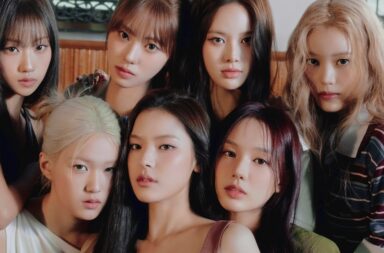
September 2019 was when the world last saw Twice. After releasing their eighth mini album, Feel Special, the group had over eight months of musical silence (aside from a pre-recorded Japanese release)— the longest gap between comebacks Twice has had so far. Feel Special, as well as the previous April’s Fancy You, had been two high-quality releases which marked an increasing maturation of Twice’s sound, so all eyes were on the group to see where they would go next. Fortunately, More and More is successfully able to maintain Twice’s newfound mature sound, and showcases further sonic exploration.
A variety of styles are explored on the album: every song sounds distinctly different from the next. A few genres are ones Twice haven’t explored yet, such as the tropical house of the title track or the Latin pop of “Firework”. “Oxygen” is an example of excellent example of Twice’s sonic exploration: a song which contains a few experimental elements, while still feeling firmly like a Twice song. The verses begin with a minimalist house instrumental before launching into a more powerful beat during the choruses (or possibly, the pre-chorus— the song’s structure allows some room for interpretation).
The super-catchy “I really really really want” hypes up the listener before we are launched into the beautiful, soaring vocals which make up part of the instrumental for the rest of the chorus. This slightly experimental chorus perfectly releases all the built-up tension, as the song smoothly goes from pleasant minimalism to joyful maximum, and is an excellent example of just the right amount of experimentation increasing a song’s enjoy-ability and memorability, while also not alienating listeners.

The bouncy “Sweet Summer Day” also retains that “Twice” flavour by sounding like a more mature version of some of their older, cuter songs. The song is filled with light-voiced chants and sugary vocals, but also backed by a retro-style instrumental featuring an energetic and stylish piano melody, which elevates it.
Other songs show sonic maturity by challenging Twice’s previous material: in particular, the “Twice title track formula” — i.e. which member sings which part of the song — is challenged with “More and More”. In most of Twice’s title tracks, the chorus is split between Nayeon and Jihyo. Sana and Tzuyu have also shared the chorus in “Signal” and “What Is Love,” with Sana also contributing to “Knock Knock” and “Likey,” and Jeongyeon to a couple of others, but Nayeon and Jihyo are the overwhelming chorus leaders.
In “More and More”, the chorus is split between Dahyun, Mina, Tzuyu and Momo. Dahyun and Momo in particular are frequently given very few lines overall in title tracks, so giving them lines in the chorus is definitely a positive change from the traditional Twice formula. Additionally, Dahyun and Chaeyoung have often been given just a rap verse either between the two of them or for one of them, and have no or very few other lines. In “More and More”, however, Dahyun is given both her rap verse with Chaeyoung alongside her chorus lines. Chaeyoung is also given a pre-chorus line and part of her own singing verse alongside her rap verse.

As satisfying as it is to hear Nayeon and Jihyo execute a perfect Twice chorus, the switching around of parts allows the members’ different vocal colours to shine in new environments, and opens the door for yet more changes in Twice’s sound, in the form of genres and styles based around the vocals of different members.
Other songs on the mini album also allow members to shine in new ways. “Make Me Go” is one such example, where not one, but four Twice members take turns rapping/speaking the sensual chorus:
Love me love me now
Love me love me good
Don’t need nobody else when it feels this good
Ain’t nobody around do it like it should

“Make Me Go” is definitely one of the standouts — if not the main standout — of the album. Not only does the sparse, thumping beat allow the members’ vocals to stand out, but it provides a both simple and classy background to the song’s lyrics, which are a huge step forward in terms of maturity. When the beat drops out to make room for the song’s entirely English chorus, the impact of both the meaning of the words and the members’ sultry delivery hit hard, leaving no room for ambiguity. There is no doubt about it: Twice have grown up.
This isn’t Twice’s first foray into more mature lyricism, although it is certainly one of the most explicit. Interestingly enough, some of their most mature, unique and impactful lyrics have been written by the members. Fan favourite “Love Foolish”, co-written by Momo on Feel Special, describes the emotional rollercoaster of a toxic relationship. Jihyo sets boundaries for herself, and warns others that she would speak up if they crossed them, in “Get Loud”, and fans have recently theorised that the Chaeyoung-penned “Strawberry” on Fancy You is about hickeys, giving a new meaning to the “freckles like strawberries” mentioned in the lyrics. Feel Special also had no less than five out of its seven songs featuring lyrics co-written or entirely written by various members.

“Make Me Go”, meanwhile, is one of only two tracks on More and More with lyrics written by a Twice member. Although I personally believe that artists not writing their lyrics doesn’t inherently decrease the quality or perceived “legitimacy” of music — a talented performer and a talented songwriter working together may create a better final product than either of them working alone — More and More featuring more songs lyrics written by the members would have showcased their improving skills even further, and might have gotten us even more lyrically surprising gems like “Make Me Go”.
A couple of other songs on the mini album also stand out lyrically. In “Shadow”, Twice sing about releasing repressed emotions through dancing alone at night:
Even when it hurts, I pretend to be fine, pretend to be a grown up
Hide the real me
Without even having time to ask if this is actually okay
If this is something normal…
Shadow, shadow that’s dancing alone
Let me be freer, freer
The dark, lush synths of this track feel like a cool breeze through the window on a midnight drive, calling the listener to plunge into this night with Twice, and to dance and feel free alongside them. The lyrics also echo themes of mental health briefly explored in “Feel Special”— themes which I wish Twice would continue to explore, as they have a particular knack for songs which can comfort or cheer up listeners (pun intended).
The lyrics of “More and More” also stray from Twice’s usual title track fare: where the vast majority of their title tracks have focused on topics such as sending a signal to the boy they fancy, or wondering wide-eyed about what love is, “More and More” sees Twice becoming more confident and assertive, even from the song’s opening lines:
I know I want it
I’m not gonna try to please you anymore
Cause I deserve it
As the song continues, Twice tells the listeners that, no matter how hard they avoid them, they will ultimately keep coming back and wanting more and more. In many ways, the song is like an improved version of “Yes or Yes“— one which avoids the issues of consent which arose from lines such as “I will say no to your no, is it me or us?”. It is also a direct opposite to these lines from TT:
The more I try to push you away
The more I’m drawn and attracted to you baby
Twice are on the other side now: they are the ones who keep attracting people to them. They are the ones taking control of their story and knowing what they want: a far cry from the shy (shy shy) girls they once were.

However, despite the fact that this title track does show lyrical maturation in regards to Twice’s previous work, that also doesn’t mean that it stands out in the current landscape of K-pop, where songs about self confidence and being an “it girl” have abounded for years, causing these lyrics to appear borderline generic. The lyrics of the other songs on the album, while well-written, also tend to play it safe.
Lyrics are not the only area where the mini album becomes generic: the melodies on this album are generally hit or miss. “More and More” in particular suffers from the issue of overly familiar melodies, which isn’t a good sign for a title track, as it makes it less memorable. While the song’s dance break and rap bridge are able to stand out, other areas do so significantly less. Some fans have already pointed out the similarity of the “more, more, more” pre-chorus to the chorus of American girl group Fifth Harmony’s 2016 release “Work From Home” (a perfect time for us all to remember this song, as well). This similarity is relatively excusable, as its repetitive quarter-note melody is an extremely basic one. However, the pre-chorus also rings with familiarity— I still have yet to discover which song it reminds me of, but the sense of deja vu is overwhelmingly strong.

In addition to this, “More and More” relies on some overly familiar production elements and sounds, such as the tropical house-based chorus made of chopped up vocals. Personally, I enjoy the chorus a lot— it has an engaging melody, and I do not believe tropical house is a genre K-pop needs to leave behind anytime soon.
However, the song was partially composed by Swedish pop singer Zara Larsson, and her influence on the chorus is verging on the edge of too much, sounding almost like one of her songs rather than a Twice song. I also believe that K-pop is at its best when it steers clear of Western melodic cliches and song structure, and/or brings elements of complexity into songs which Western artists steer clear of. While Twice’s fun, summery venture into tropical house can (and should) be appreciated, it could have been done without sounding like it was partially recycled.
Even though Twice definitely diversifies their sound with this album, exploring a new genre does not necessarily mean that a song cannot be forgettable. “Firework” is one example of this. While the song is certainly a solid foray into Latin-inspired pop — reminiscent of K-pop songs such as Mamamoo’s “Egostistic” and AOA Jimin’s “Hallelujah,” among others — and is new territory for Twice, there is nothing about the song which particularly stands out, or grabs the listener and makes them eager to come back for more. In addition to this, the two-note high-pitched vocal sample that occasionally echoes throughout the song causes the chorus of Nick Jonas’ 2014 single “Jealous” to fly into my mind and disrupt the mood of the song, but maybe that’s just me.

In other cases, such as that of the brassy, sassy “Don’t Call Me Again”, the song feels incomplete— specifically, in that it fails to make any points, or be as impactful as it should be, considering its assertive title. It is a fairly static song, and lacks dynamics: the song goes full throttle at the start with its bombastic first verse and loud, incessantly repetitive background brass melody, and the energy rarely lets up for the rest of the song.
The rare moments of rest come as the background melody drops out during the pre-choruses, but the verses and chorus have similar levels of energy. Despite the group’s powerful vocals, the chorus fails to have much of an impact. Being bombarded with the same brass melody for most of the song, as well as the phrase “don’t call me again”, also gets tiring, and just when a bridge is needed to bring some well-needed quiet to the song, or perhaps some kind of development or contemplation, the song simply ends, leaving the listener in the same place as they were at the beginning.

“Sweet Summer Day” also errs on the forgettable side, as it seems like a song which, genre-wise, could appear as filler on other K-pop artists’ albums. At the same time, there is something about this song which engages the listener. Its layered and textured instrumental, as well as the members’ vocals, give the song the “Twice” personality lacking in “Firework” and “Don’t Call Me Again”.
Although More and More sees Twice continuing the maturation of their sound, its main stumbling block would be that many of the albums’ strengths also act as its weaknesses. Some of its songs show significant lyrical maturity, while others remain the same; some songs explore new soundscapes while others use ineffective or overused sounds. For these reasons, this album isn’t necessarily a step forward from Feel Special, but rather simply not a step back.
Despite this, More and More is a positive effort for Twice, and does feature many moments where the group is able to shine. It continues to showcase Twice’s ever-increasing maturity, and, more significantly, even more of their potential. With a bit of a push, their next effort — perhaps their sophomore album? — could turn out to be truly fantastic. For now, this mini just needs a little bit… more.
(Images: JYP Entertainment. Lyrics and translations from Color Coded Lyrics.)


